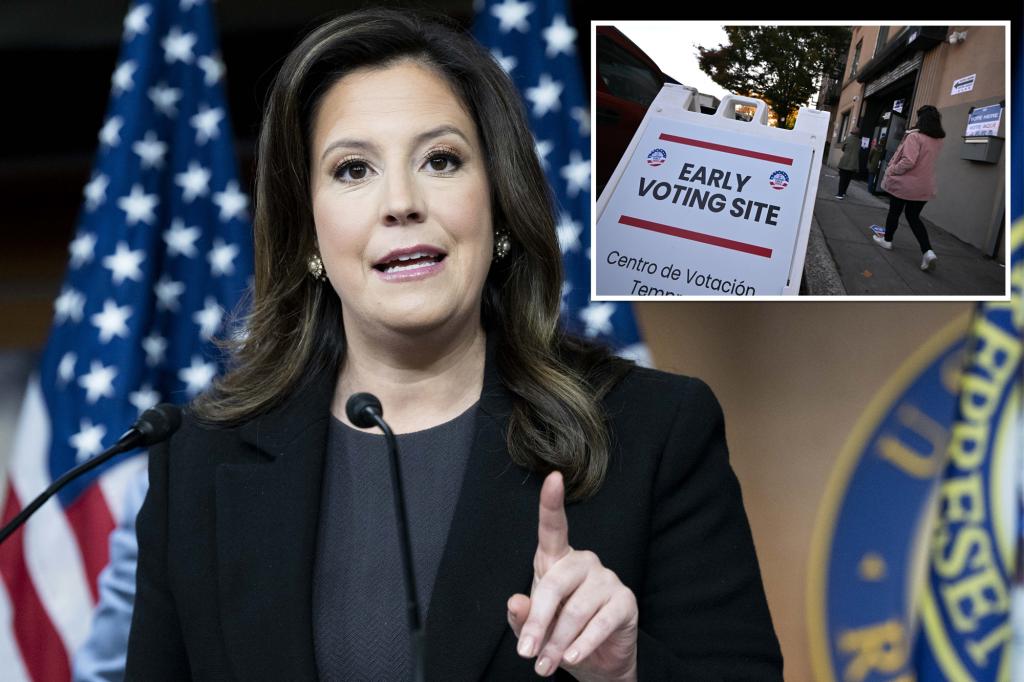Upstate New York Rep. Elsie Stefanik announced plans to pull funding from NPR following an inaccurate claim by a North Country Public Radio (NCPR) reporter regarding early voting. The reporter suggested that Stefanik couldn’t vote for herself due to casting an early ballot in a different district. However, Stefanik clarified that the polling location was open to all voters in the county, including those from the 20th and 21st districts following the upcoming election due to redistricting. She accused NCPR of election interference and misinformation targeting voters in her district to suppress the vote.
Although Stefanik currently doesn’t live in the district she represents, changes in congressional maps earlier this year will place her within the district boundaries after the election results are finalized. She pointed out that House representatives are not required to live in the districts they represent. Stefanik, who supports Donald Trump for president, claimed her office received confused phone calls from voters due to the inaccurate tweet by the NCPR reporter, Emily Russell. She emphasized that voters in New York are eligible to vote at any early voting location within their county and vehemently declared her intention to defund NPR.
Stefanik’s office stood by her accusations even after Russell deleted the erroneous tweet and issued an apology. The congresswoman’s fiery statement is in line with past efforts by Congressional Republicans, including herself, to end federal funding for NPR based on claims of left-leaning bias. The ongoing dispute with the NCPR reporter is part of Stefanik’s bid for a sixth term in office, where she faces a challenge from Democrat Paul Collins. In the neighboring 20th Congressional District, Democrat Paul Tonko is running against Republican Kevin Waltz.
In response to the inaccurate claim made by the NCPR reporter, Stefanik accused the outlet of spreading false information and engaging in illegal election interference. She criticized their actions as an attempt to suppress the vote in her district and labeled the affiliate as disgraced and lazy. Stefanik highlighted her own early voting participation in the NY21 district and emphasized that voters could vote at any early vote location in their county, including the polling spot in question. Her decision to defund NPR reflects her strong stance against what she perceives as biased reporting.
The incident involving NCPR and Stefanik underscores the contentious nature of political coverage in the media, particularly during elections. Stefanik’s allegations of interference and misinformation highlight the challenges faced by candidates in ensuring accurate and fair reporting. The clash between the congresswoman and the NPR affiliate raises questions about journalistic integrity, media accountability, and the role of news organizations in shaping public opinion. Despite the apology from the reporter involved, the fallout from the incident has further fueled the ongoing debate over funding for NPR and the broader issue of media bias in the current political landscape.
Stefanik’s decision to defund NPR is part of a broader push by Congressional Republicans to limit federal funding for the outlet, citing concerns about its perceived liberal bias. The congresswoman’s public statement against NPR reflects her commitment to challenging media narratives that she views as unfavorable to conservative viewpoints. The controversy surrounding the inaccurate claim made by the NCPR reporter has become a focal point in Stefanik’s reelection campaign, further underscoring the intense polarization in American politics and the role of the media in shaping public discourse. As the election approaches, the fallout from the incident is likely to fuel ongoing debates about media credibility, journalistic ethics, and the influence of partisan reporting on democratic processes.


